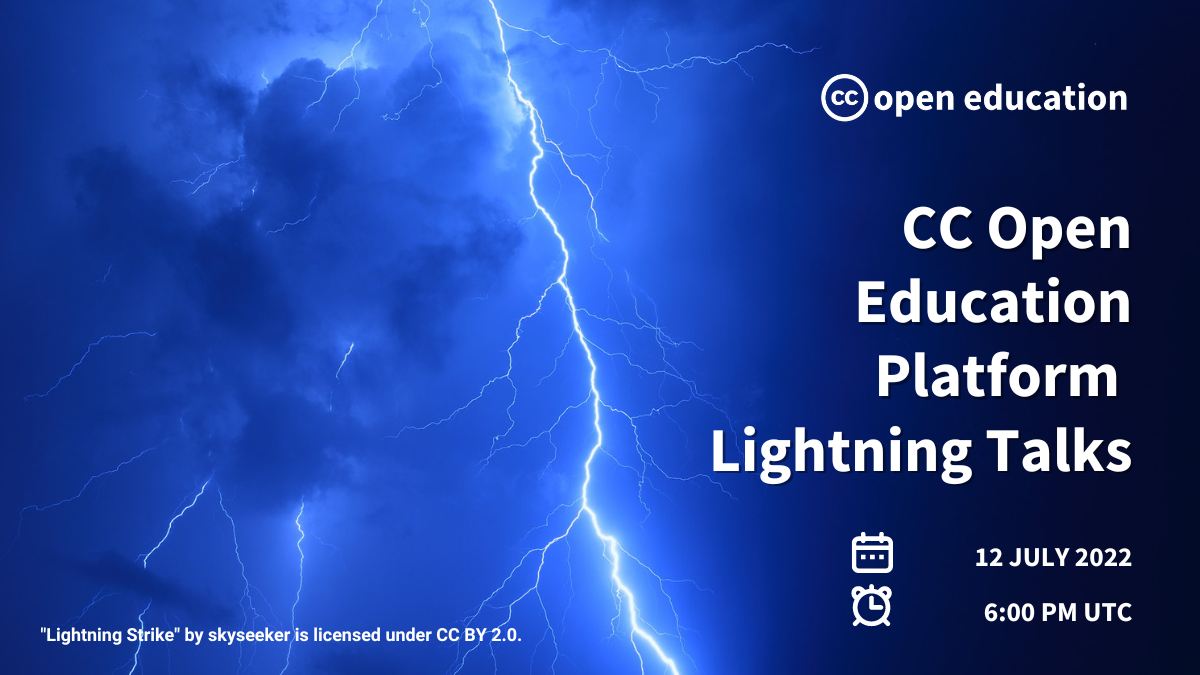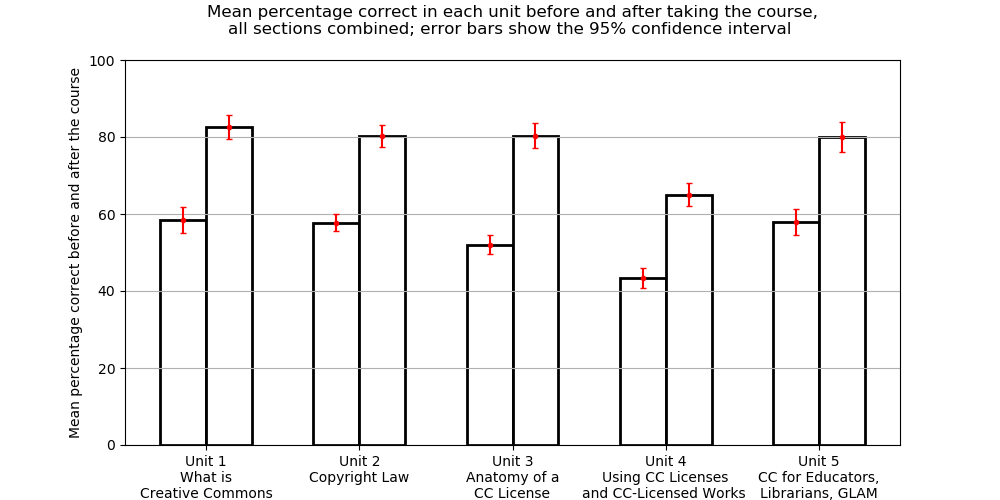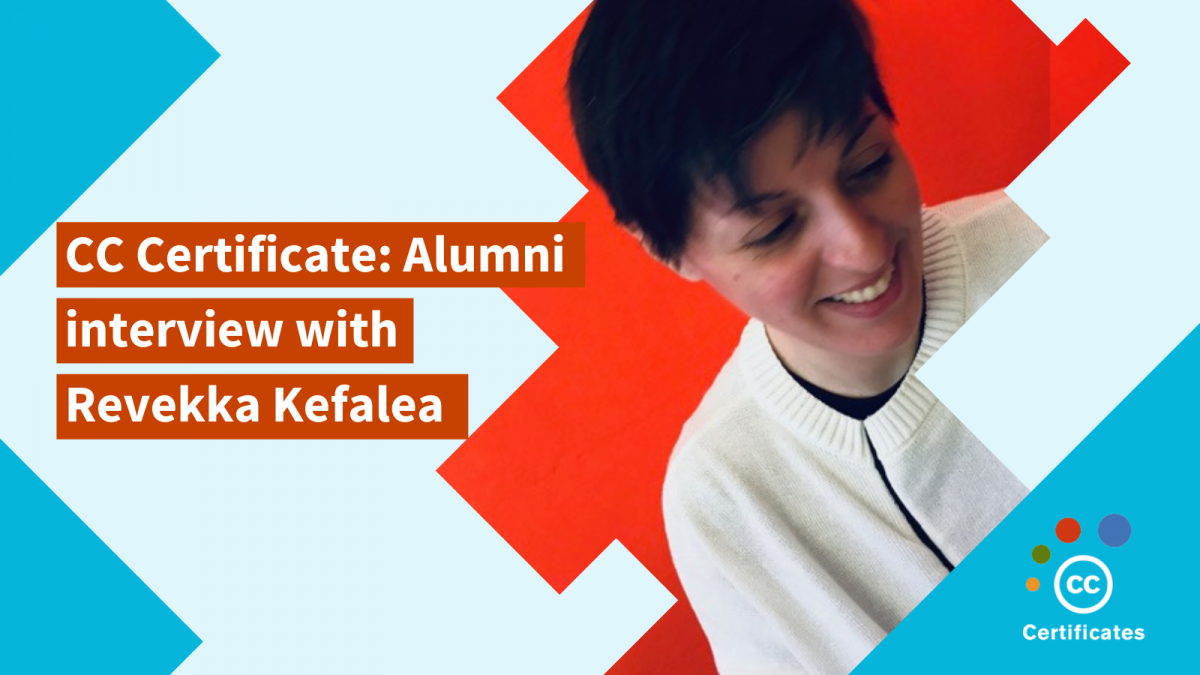Launched in 2018, the Creative Commons Certificate program has trained and graduated over 1000 people from 56 countries. Creative Commons staff are regularly inspired by the community of Certificate alumni, accomplishing incredible things in open knowledge and culture. CC Certificate alumni have used the Certificate course knowledge in a number of ways—read about how alumni havedeveloped open licensed content for a bachelor of business program in BangladeshandMasters courses in the US. Or read about alumni testimonialshere.

In this interview, we were delighted to speak withRevekka Kefalea, a graduate of the CC Certificate for GLAM (galleries, libraries, archives and museums).
Revekka works as project manager at the civic, non-profit organizationInter Alia(Athens, Greece), conceptualizing, managing and monitoring the implementation of projects in relation to arts, (digital) cultural heritage, open access and civic engagement. She holds a BSc in Social Policy and Social Anthropology (Panteion University), a MSc in Urban and Regional Planning (National Technical University of Athens), and a MSc in Political Science and Sociology (National and Kapodistrian University of Athens). She is also certified in cultural management and social entrepreneurship, and closely follows the GLAM sector and its transformations, since her research interests focus on nationalism, material culture, cultural heritage, identity and memory politics. Here is the Q&A:
What inspired you to take the CC Certificate for GLAM?
I decided to take the CC Certificate for GLAM almost two years ago, when it was first announced on the CC website — that is when I started saving money for it. At that time, I was writing myMaster’s thesison the history of access to national museums, in light of the mass digitization projects of cultural heritage and the Open GLAM movement. But the story about my sources of inspiration and motivation goes way back in time.
大约在2008年至2009年,我在参与一个研究项目(在希腊雅典的一所公立大学)时发现了“开放获取”这个词,当时文化遗产的大规模数字化项目正在兴起。当然,我也从这一发展中受益,因为我能够轻松免费地在数字图书馆和馆藏中找到我研究所需的材料。一切都只是一个点击的距离!此时,希腊正面临着2007-2008年金融危机之后的债务危机;公共部门的资金大幅削减,包括公立大学和图书馆的资金。这种情况让我思考:如果没有这些大规模的数字化项目、开放存取、数字馆藏和图书馆,我还能继续我的研究吗?我买得起吗?那些收入比我低的人怎么办?他们如何能平等地获得教育和知识资源,以克服危机造成的不平等和障碍?
Being in this situation and triggered by these questions, I started exploring the open culture / open GLAM movement more closely. In December 2018, I decided to launch a non-formal, self-funded initiative (GLAM Hack) to spread the word about the research, educational and creative possibilities of open access via workshops and other events. You can read more about the work onthe blog post.
In this effort, I reached out to the founders of Inter Alia for support and feedback, and they proposed to hire me, providing me the opportunity, on the one hand, to go on with my initiative autonomously, and on the other, to advocate for open access within the context of Inter Alia’s projects. This development was very rewarding, but also very challenging for me, becauseadvocating for open access requires knowledge about copyright law and CC licenses, as well as considering various economical, ethical, and social-political issues that arise when digitizing and opening access to cultural heritage materials online. I had to read a lot about these topics on my own; and, at some point, I realized that I need to systematize my knowledge to articulate stronger arguments (and especially, arguments beyond the legal aspects of digital access). This is when the CC Certificate came to my attention. The timing was just perfect!
“Would I be able to continue my research without the existence of these mass digitization projects and open access, digital collections and libraries? Would I be able to afford it? And what about other people with lower income than mine? How could they equally get access to education and knowledge resources to overcome the inequalities and obstacles posed by the crisis?”
Tell us more about your current project and any challenges or early successes you’ve experienced:
Currently, I am involved in the Creative Europe projectECHO II: Traditions in Transition, advocating for its open access policy. Within its context, we invited artists to participate in five art residencies, and create original artworks inspired by selected local traditions from Greece, Bulgaria, North Macedonia, and Hungary. After each art residency, we digitized theartworks, and published the digital copies on the website under theCC BY-SA 4.0许可证。当然,我们办理了所有的法律手续;考虑到版权法的复杂性以及对CC许可的误解,这对我们来说是一项非常艰巨的任务。But we managed to go through this, because opening access to the project outcomes was our clear goal from the very beginning, and we were transparent about it along the way – we even included a specific section about it in all ouropen calls for artists.
除了公开发布艺术品的数字收藏,我们更进一步,在网站(“地点|传统”网页)上包括了关于所选传统的信息,以及来自开放存取资料库和文化遗产聚合平台的插图。我们这样做,因为我们不希望只是创建另一个只展示其进展和结果的项目网站,而是要创建一个对更广泛的社区有用并为任何目的使用的知识库。然而,如果你探索这一节,你会发现“位置|传统”的网页是不平等的发展和说明。由于语言障碍,以及COVID-19带来的限制,我们不得不严重依赖开放获取的数字平台,特别是具有丰富英文元数据的资源和内容。当然,我们认为这种对所选传统的不平等代表是个问题。我个人认为,这是欧洲国家大规模数字化和文化遗产开放发展不平等的一个标志。但它也突显出,一方面,丰富、多语言元数据的重要性,另一方面,开放获取glam的重要性,不仅对研究和教育,而且对创意和公民社会部门。
“Advocating for open access requires knowledge about copyright law and CC licenses, as well as considering various economical, ethical, and social-political issues that arise when digitizing and opening access to cultural heritage materials online.”
What do you aim to do next?
Inspired by theCC Certificate resources, theCC Toolkit for Business, and the publicationsMade with Creative CommonsandThe Power of Open, I prepared and just offered (in the context of the ECHO II project) a pilot workshop on (a) the history of copyright and CC licenses, and (b) open business models for artists, heritage professionals, cultural managers, and open culture / open GLAM activists. I would like to enrich the content of this workshop and offer it again in the near future, taking into consideration the developments in the so-called platform economy.
More broadly: if you had to guess, what is next for the open culture / open GLAM movement? What should we be looking for in the future?
Hm… This question is really difficult to answer, because we (need to) work simultaneously on many levels and towards various directions… Every aspect is equally important… In any case, based on my educational background, work experiences and research interests, I can suggest the following two issues:
- The current discussions around digitizing and opening access to cultural heritage collections online stress the economic costs and risks that GLAMs (need to) take into consideration before adopting their own approaches and policies. Of course, economic resources play a fundamental role in these processes, and hence, GLAMs need to have funding for them. However, public and private funding varies greatly across institutions, national states, and even fiscal years (since it is tied to the general state of the economy, and usually is least available when it is most needed). But maybe, we can look at the situation from the reverse point of view, and -from the existence or lack of financial resources- we can draw conclusions about the role, status and importance of GLAM institutions in national cultural policies, histories and identities. I think that such an approach would help us, on the one hand, to explore the power relations and dynamics existing in the GLAM sector, along with the ideological, and socio-historical factors that (re)produce them; and on the other, to draw a more complete picture of the various influences in GLAMs’ processes and practices. In this light, present-day challenges might appear less puzzling and easier to overcome.
- In the open culture / open GLAM movement, we usually highlight the benefits of open access for societies in general and GLAM audiences in particular (e.g. production of new knowledge, enhancement of creativity, generation of new business ideas, etc.), but we rarely discuss the premises for the audiences to be able to reuse and remix open content for their own purposes (research, education, entertainment, entrepreneurship, etc.). If the ultimate goal of open access is to encourage and ensure everyone’s active and equal participation in the transformation of knowledge and culture, then every reuser -apart from internet/web access- needs to have advanced digital skills and to be knowledgeable in many fields (e.g. research methodologies, classification systems, copyright laws, codes of ethics, social and cultural norms, programming etc.) to be able to do so. From the standpoint of a reuser, it seems to me that digital cultural heritage collections and aggregation platforms (including their creative functionalities) tend to be designed with an ideal internet user in mind, who is supposed to already have all the necessary knowledge and skills. However, this is rarely the case; and hence, along with building the capacities of GLAM institutions and professionals, we also need to respond to the audiences’ needs. And in this effort, apart from offering educational activities and helping GLAMs open their collections, we also need to encourage them to explain and open their internal processes and practices.
“从重用用户的角度来看,在我看来,数字文化遗产收集和聚合平台(包括它们的创意功能)往往是为一个理想的互联网用户设计的,他们应该已经拥有所有必要的知识和技能。然而,这种情况很少发生。”
非常感谢你接受我们的采访,Revekka!在我们结束之前,你对开放文化的倡导者有什么建议吗?
Well, I can say what I repeatedly say to myself:
- Opening access to knowledge and culture is a never-ending process for various reasons — first and foremost, because collecting and preserving knowledge and heritage materials for the present and future generations is a never-ending process itself. So, don’t get discouraged and don’t give up; be persistent and patient at the same time.
- No one can be fully aware of all the issues that need to be considered when advocating for open access. Fortunately, though, the members of the open community are experts in a wide variety of topics, and, due to their mentality and values, they are always willing to share their knowledge and expertise. So, don’t be shy; just reach out and ask for help.
我们庆祝Revekka的优秀工作,我们想庆祝更多的CC证书校友的工作!If you have a story about something you’ve tried or an open project you’ve accomplished at your institution, please let us know (emailcertificates@www.familygiver.com).




